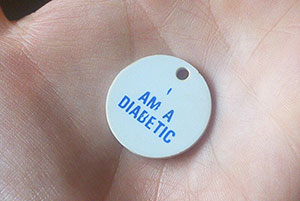What is diabetic eye disease?
People with diabetes are unfortunately at a higher risk for numerous diabetic eye diseases, which can lead to severe vision loss and sometimes even blindness. Diabetic eye diseases include cataracts, glaucoma and diabetic retinopathy.
What is diabetic retinopathy?
 Diabetic retinopathy is an eye disease that damages the blood vessels in the retina and usually affects both eyes. Diabetic retinopathy can affect people with Type I and Type II diabetes. The four stages of diabetic retinopathy are:
Diabetic retinopathy is an eye disease that damages the blood vessels in the retina and usually affects both eyes. Diabetic retinopathy can affect people with Type I and Type II diabetes. The four stages of diabetic retinopathy are:
- Mild Non-Proliferative Retinopathy: Minor swelling occurs in small regions in the tiny blood vessels of the retina.
- Moderate Non-Proliferative Retinopathy: The blood vessels in the retina are blocked.
- Severe Non-Proliferative Retinopathy: The blockage of the blood vessels causes malnourishment to the retina, which causes the retina to send signals to the body to create new blood vessels.
- Proliferative Retinopathy: The newly formed blood vessels develop along the surface of the retina, and are very fragile. Their fragility can cause them to leak, which can cause severe vision loss and even blindness. This stage can also cause macular edema, which can lead to vision loss.
What are the symptoms of diabetic retinopathy?
There are no common symptoms present during the early stages of diabetic retinopathy. Retinal swelling due to leakage of fluid from retinal blood vessels will cause blurred vision and/or distortion. Displacement of the receptors within the retina can cause objects to look smaller, larger, blurred or distorted.
If you experience blurred vision or "floating" spots, contact our office as soon as possible. When left untreated, proliferative diabetic retinopathy will be more likely cause severe vision loss and even blindness. The earlier you receive treatment, the more likely the treatment will be effective.
How is diabetic retinopathy diagnosed?
Diabetic retinopathy is often detected during routine eye exams. If you have diabetes, maintaining regular visits to your ophthalmologist is key to your overall health. Your ophthalmologist will monitor your eye for evidence of leaking blood vessels and signs associated with diabetes. If a person is in the final stage of diabetic retinopathy (proliferative retinopathy), laser treatments are available to help shrink the fragile blood vessels, which can ultimately preserve the rest of their sight.
How can I prevent diabetic retinopathy?
People with diabetes can help prevent the development of diabetic retinopathy by carefully managing their blood sugar level, blood pressure and blood cholesterol. When dealing with vision loss as a result of diabetes, the most important key to early intervention is maintaining a healthy blood sugar level.
Is there a cure for diabetic retinopathy?
No. Since diabetes is a problem that affects your entire body, it affects all of the vessels of the retina, as well as other areas. The best way to handle diabetic retinopathy is through prevention with blood sugar control and exercise. The best way to control diabetic retinopathy is to control your diabetes.
